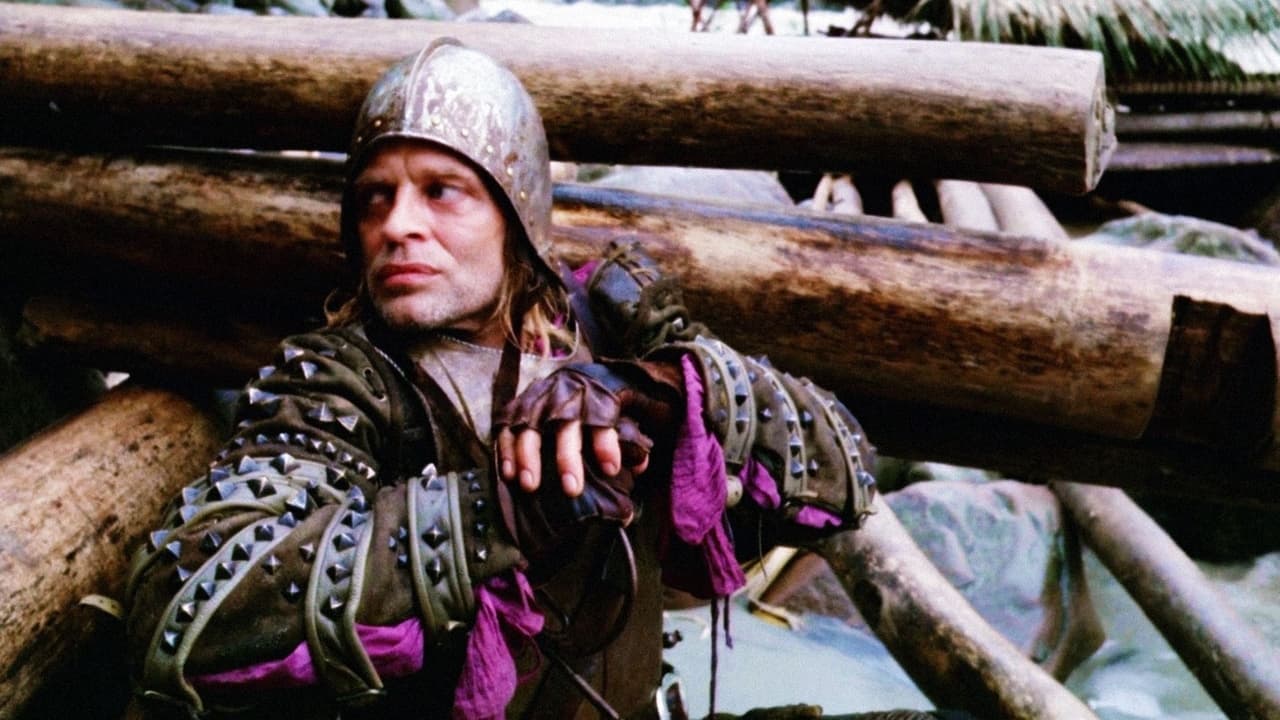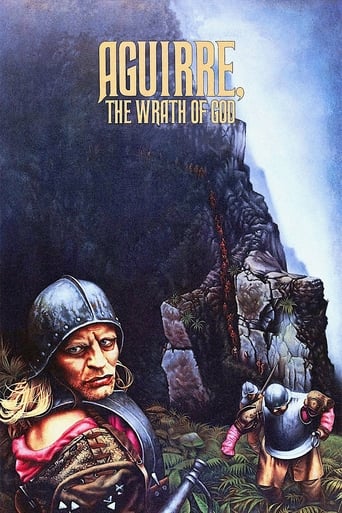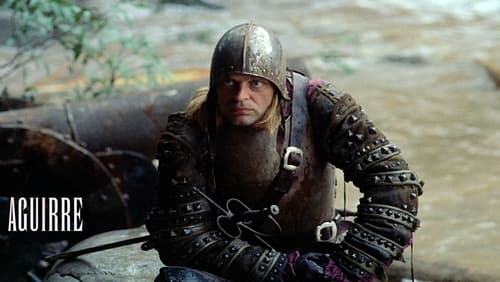



Really Surprised!
I like movies that are aware of what they are selling... without [any] greater aspirations than to make people laugh and that's it.
View MoreI think this is a new genre that they're all sort of working their way through it and haven't got all the kinks worked out yet but it's a genre that works for me.
View MoreJust intense enough to provide a much-needed diversion, just lightweight enough to make you forget about it soon after it’s over. It’s not exactly “good,” per se, but it does what it sets out to do in terms of putting us on edge, which makes it … successful?
View MoreComing off a recent vacation trip to Costa Rica, I was struck by the similarity of the Peruvian locations serving as the backdrop to this story. Our tour group had a couple of rain forest hikes along with two wildlife spotting river cruises, and if I didn't know better, I would have pegged the muddy brown, tranquil river in the movie as the Rio Frio. What struck me though was that the long views of the riverbanks in the picture offered no animal or bird life, which was in abundance on my excursions. Anyway, enough of that.The film begins with an impressive looking descent down a steep mountain pass, and as a harbinger of things to come, director Herzog chooses to focus his camera on long establishing shots, often times unnecessary as in the drawn out view of the turbulent river rapids early in the story. These serve to pad out the length of the picture, which is only a tad over an hour and a half to begin with. With the title acknowledging that the principal character is named Aguirre, it takes some time for Klaus Kinski to initiate the mutiny that takes over the expedition hunting for the mythical El Dorado, the ancient Inca Lost City of Gold. Aguirre is a fanatic, but allows some semblance of composure as second-in-command while undermining the authority of both the original leader Gonzalo Pizzaro (Alejandro Repullés), as well as that of Don Pedro de Ursua (Ruy Guerraas), the leader of the smaller expeditionary group.What's perhaps most revealing in the story is how difficult it must have been in an a pre-machine age for explorers to make their way through uncharted jungle territory. Watching men drag along cannon and Ursua's mistress (Helena Rojo) aboard a throne-like sedan chair seemed like an incredible waste of energy that eventually ended in a failed mission. And then one has to consider that the director, actors and film crew had to endure these same hardships for the sake of their craft. A 'making of' picture detailing the effort probably would have been as compelling as the film's narrative.I'd consider myself a Klaus Kinski fan, even though I've mainly seen him only as a villain in off-beat Western movie roles. He doesn't quite carry the entire picture here as the principal actor, but his presence does create an eclectic magnetism of a man obsessed by the idea of power, fame and riches. As his men are decimated by unseen arrows, spears and poison darts, his fateful descent into madness is complete, forever to be defeated by the relentless force of an unforgiving environment.
View MoreDirector Werner Herzog and actor Klaus Kinski did some fantastic and outstanding works together, besides Aquirre, the Wrath of God I would name Fitzcarraldo (1982), Cobra Verde (1987) and Nosferatu (1979).In Aquirre Kinski plays the ruthless and insane and passion driven Don Lope de Aguirre, leading a Spanish expedition of Conquistadors to find the city of El Dorado and plunder its riches for the Spanish crown and for himself. What most of them find is an endless jungle, heat, fever and other plagues, hostile natives and madness and finally death. Kinski is one of the few, rare actors who are able to play such intense characters like Aquirre without ridiculing them in on or the other way. And Werner Herzog is a daring director with vision and a look and care for details. Alone the tensions and group dynamics between the Conquistadors are superb choreographed.If you want outstanding movies for your dish, The Wrath of God and the other mentioned movies are made for you: what you get are intense acting, fabulous and unique story(telling) and a great production with (as far as I can tell) great care for historical accuracy.
View MoreMy expectations going in to this film were pretty high given its critical acclaim and reputation. Grizzly Man is the only other Herzog film I have seen and it happens to be my current favorite documentary of all time, so needless to say I was quite excited to see another film by him. And I'm happy to report that, although on a first viewing I didn't love it to quite the same degree as Grizzly Man, Aguirre: The Wrath of God definitely did not disappoint. I was quite interested to see what Herzog's style would be like as a filmmaker working with his own script and actors rather than as a documentarian. Based only on this film, he definitely seems to have a very deliberate, methodical air to his direction. The entire film is very even-toned and it slides along at a steady pace that feels neither fast nor slow. There is definitely an emotional coldness to the film that feels almost Kubrickian. None of the characters are very relatable or likable; quite the contrary in fact - they are consumed by greed, selfishness and delusions of grandeur, our "hero" in particular. Thus, there is an emotional distance between the audience and the characters that is definitely reminiscent of a Kubrick film.And ironically, despite the fact that I turned to this movie as my first Herzog non-documentary, the film almost feels like a documentary. The way the film is shot with hand-held camera and without any pomp or dramatization makes everything feel so real and authentic. It's very obvious that everything in the film was done for real on location and that is to its advantage as you really feel like you're there with these men rather than just watching a dramatization.This ultra-realism also works very well in bringing the themes of the film through and making them resonate. The film is clearly about man's misguided and even delusional thirst for power. Aguirre embodies this more than anyone in the film - a man with very clear delusions of grandeur who fancies himself a god despite clear evidence that his expedition is futile and doomed to failure. Klaus Kinski gives a spectacular performance in this role which is even more impressive given his relatively minimal amount of dialogue. He just has such an ominous presence on screen, his face perpetually twisted in a snarl, and he becomes almost hypnotic to watch as the film goes on.And it isn't just Aguirre. Essentially every Spaniard in the film engages in treachery at least once, including the holy man who utters one of the most searing lines of the film: "You know, my child, for the good of our Lord, the Church was always on the side of the strong." Ouch. These men commit mutiny, elect "emperors", make grand declarations of land ownership, and hold trials with their only audience being the indifferent tangle of vegetation and the raging river. The realism of the film perfectly captures how delusional these men really are as they parade around with their notions of power and fame in the middle of the jungle. Nothing could be further from the truth as they slowly succumb one by one, lost in a foreign and foreboding land. And their impossible goal of finding El Dorado, the imaginary city of gold, is the perfect metaphor for their delusion. A great strength of the film is that the way this theme is executed feels so universal. Herzog isn't just showing us the madness of these particular men in this particular scenario, he's showing us the madness of man in general. He showing us that these illusions of power are just that - illusions. In the grand scheme of the world and the universe, the titles of men are meaningless and transient.Aguirre: The Wrath of God is a powerful film and an impressive achievement from a filmmaking perspective. However, it is definitely not a movie that is out to entertain or dazzle its audience. It is a film of ideas rather than plot or spectacle. Really the only criticism I can make of the film on a first viewing is that there were some moments of humor which felt a bit out of place given the tone of the film - a man makes a quip after being shot with an arrow or a decapitated head speaks its last word. There is definitely an absurdity to the film and you could argue that these scenes play to that, but I felt these moments perhaps went a bit to far and were too cartoony to mesh well within the film's fabric of realism. Regardless, it's a minor complaint which does very little to sour an otherwise excellent film.
View MoreWerner Herzog's 'Aguirre, the Wrath of God' is not a film that can be merely watched, it has to be experienced. While watching the film, I truly thought that Herzog didn't just convey a story, he put a bit of his heart and soul on screen. The film stars Herzog's frequent collaborator, the eccentric and volatile Klaus Kinski who plays the titular role of Aguirre. Although the story is loosely based on real events, the script is pretty much a fictional account of the travels of a Spanish soldier named Lope de Aguirre who leads a group of conquistadores and their Indian slaves down the Amazon river in South America to find El Dorado, the city of gold.The film commences with a prolonged single shot of the line of conquistadores with the Indian slaves going down a mountain and the shot is slightly obscured by the mist. The camera stays stationary while it captures the scene. It is a shot that is immensely beautiful in its surrealism while also being thematically transcendental. The men look like ants walking in a straight line. They have huge ambitions of conquering lands and becoming rich, but they are nothing but tiny ants in comparison to the vastness of the mountain and the surrounding elements of nature. Popol Vuh's haunting music lends a spiritual undertone to the entire film.I believe this film is about man's obsession with power, fame and superiority and how God in the form of nature can be completely indifferent to these obsessions and ambitions. I think the principle of accepting nature as God like it is done in some religions like Hinduism is the basis of interpreting the meaning of the film. When the conquistadores led by Aguirre try to ransack nature, nature hits back. All the deaths happen off- screen. We are never shown anyone firing the arrows at the conquistadores. We just see the arrows flying towards them, almost creating the impression nature is fighting back and thwarting the greedy conquerors. This aspect of man's mad obsession falling prey to the nature's forces was clearly an inspiration for Coppola's 'Apocalypse Now'. Aguirre is the manifestation of the greed and lust for power that humanity can fall prey to internally. His obsession spreads through the others in the mission and anyone who questions Aguirre gets dealt with mercilessly. Considering that this film was the creation of a German filmmaker, I found it very difficult to not think about Hitler and Nazi Germany. Aguirre shares Hitler's colonial obsession with annexing other countries and conquering nations. We also get another similarity between Hitler and Aguirre in their desire to create a pure dynasty. The film's production and shooting processes have become infamous due to all the troubles that Herzog had to face in the form of lack of money, highly treacherous filming locations and the anger of the extremely volatile Klaus Kinski. But he kept on persisting and his obsession in making the film almost mirrors Aguirre's unflinching obsession to find 'El Dorado'. There are many signature shots of Herzog's surrealist film language like the shot of a ship hanging at the top of a tree, a scene where Aguirre holds a newborn sloth and is appreciating its beauty and telling his daughter how naive it is and how it has remained asleep for the major portion of its life, but we know that Herzog clearly wants to say that it is the humans who are sleeping and naive in trying to assert their superiority over nature. Herzog also critiques religion in the film. There is a clear distinction that Herzog establishes between organised religion and God. His guerilla style of filmmaking actually accentuates and captures the madness in the story instead of serving the purpose of being a gimmick. Apart from Werner Herzog, the other person whose name has to be mentioned is Klaus Kinski. Everyone mentions Anthony Hopkins in 'Silence of the Lambs' when talking about an actor having an immense impact and owning a film with very limited screen time, I think such a discussion should also include Kinski's portrayal of Aguirre. Even with limited screen time Kinski has an undeniably chilling impact. Every gesture and every mannerism of his is expressive. His character's madness and obsession gets expressed through his postures and his eyes. This is one of those legendary screen performances that not only ornaments the film, but also ends up elevating it.To end this review I will analyse the last shot of the film. The final images will stick with me forever due to the beauty and the depth of what's on screen. There are corpses lying everywhere on the raft. Aguirre is the sole figure still standing. He holds his dying daughter. We see Aguirre's hand soaked in his daughter's blood which figuratively conveys that her death is on his hands and in the bigger picture it establishes the perils of the coming generations due to the greed fuelled obsessions of their ancestors. Now we had earlier seen the soldiers torturing animals, but now a group of numerous monkeys are seen invading the raft, thus signifying nature completing its revenge. Aguirre is still holding on to his deluded obsessions and moving on. This is one of the most beautifully poignant ending to any film I have ever seen.Aguirre, the Wrath of God is a philosophical work of art. It is not for everybody and I can only recommend it to hardcore art-film lovers. But the themes explored in the film are giant-sized. I can't stop thinking about it even after days of watching the film.Aguirre says that he is the 'Wrath of God' and then looks directly at the camera. He thinks he will do whatever he wants and no one can stop him. His naivety prevents him from realising that he is not the 'Wrath of God', he is just a victim of the same.
View More